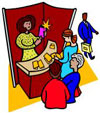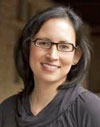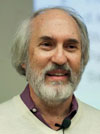| |
|
|

|
|
ATLAS |
|
|
Assistive
Technology
Laboratory
at
Stanford |
|
|
|
Technology
and design benefitting individuals with disabilities and older adults in the
local community |
January 30, 2015 |
|
|
|
|

Perspectives is the newsletter of the Stanford
course,
Perspectives in Assistive Technology.
This issue invites you to attend the next class session
and
encourages your participation in the course's assistive technology
faire.
Perspectives in Assistive
Technology is a Winter Quarter Stanford course in its ninth season
that explores the design, development, and use of assistive technology that
benefits people with disabilities and older adults. It consists of semi-weekly
classroom discussions; lectures by notable professionals,
clinicians, and assistive technology users; tours of local medical,
clinical, and engineering facilities; and an assistive technology faire.
Much more information can be found on the course
website.
|
Attend a lecture - You are invited to sit in on
class lectures that interest you. They are open
to the greater Stanford community - you need not be a Stanford student and
there is no required signup, enrollment, or charge. They will once again be
held on Tuesdays and Thursdays from 4:15 to 5:30pm in a large tiered,
accessible classroom on campus in the Thornton Center (Classroom 110) adjacent
to the Terman Fountain and near the Roble Gym, the same venue as last year.
Here are the parking options, maps, and
directions to the classroom. |
 |
|
Next class session - Tuesday, February 3rd at
4:15pm:
|
|
Rehabilitation and Assistive
Robotics
Allison M. Okamura, PhD & David
L. Jaffe, MS
Stanford University -
Mechanical Engineering Department - Design Group
|
|
Abstract:
Allison will discuss therapy robots and the use of robots to perform brain
science. She will describe the evolution of therapy robotics for stroke
rehabilitation, as well as her recent work (in collaboration with former
students and Neuroscientist Amy Bastian at Johns Hopkins University and the
Kennedy Krieger Institute) on using robots to analyze and affect the movements
of patients with damage to the cerebellum. Dave will provide a history of
assistive rehabilitation robots and in particular describe current commerical
products and research devices as well as prior projects at the VA Palo Alto
Rehabilitation R&D Center. Both presentations will include material
provided by Machiel Van der
Loos at the University of British Columbia. |
|
Allison's
Biosketch: Allison M. Okamura received the BS degree from the
University of California at Berkeley in 1994, and the MS and PhD degrees from
Stanford University in 1996 and 2000, respectively, all in mechanical
engineering. She is currently Associate Professor in the mechanical engineering
department at Stanford University. She was previously Professor and Vice Chair
of mechanical engineering at Johns Hopkins University. She has been an
associate editor of the IEEE Transactions on Haptics, an editor of the IEEE
International Conference on Robotics and Automation Conference Editorial Board,
and co-chair of the IEEE Haptics Symposium. Her awards include the 2009 IEEE
Technical Committee on Haptics Early Career Award, the 2005 IEEE Robotics and
Automation Society Early Academic Career Award, and the 2004 NSF CAREER Award.
She is an IEEE Fellow. Her interests include haptics, teleoperation, virtual
environments and simulators, medical robotics, neuromechanics and
rehabilitation, prosthetics, and engineering education. |
|
Dave's
Biosketch: David L. Jaffe holds a BS degree in Electrical
Engineering from the University of Michigan and a MS degree in Biomedical
Engineering from Northwestern University. |
|
Prior to coming to
Stanford, he was a Research Biomedical Engineer at the VA Palo Alto Health Care
System's Rehabilitation Research and Development Center. At the VA his
interests were designing, developing, testing, and bringing to market
microcomputer-based devices for veterans with disabilities including
communication, mobility, and information systems. He has worked on several VA
assistive technology research projects including an innovative wheelchair
interface for individuals with quadriplegia, an electro-mechanical
fingerspelling hand that serves as a communication device for people who are
deaf/blind, a system that explores virtual reality techniques to train
individuals with gait deficits to improve their walking, and a project that
employs a computer-based simulation to assess and improve the driving ability
of individuals after brain injury. |
|
In addition to
organizing this course, ENGR110/210 Perspectives in Assistive Technology, he
currently contributes to the definition of quarterly course projects in ME218
Smart Product Design, is a project coach in ME113 Mechanical Engineering
Design, and mentors students working on assistive technology
projects. |
|
Participate in the Assistive Technology Faire -
This third annual course event will once again provide an opportunity for
students and community members to get an up-close look at a variety of
assistive technology devices and learn about available services. Users of
assistive technology products as well as small companies and
agencies serving individuals with disabilities and older adults are
encouraged to bring assistive technology devices and information to display,
demonstrate, and discuss.
Please browse to
the Call for Assistive Technology Faire Participants
webpage and contact the course instructor if you would like to be a part of
this event as a user or vendor of assistive technology products or services.
Everyone is welcome to attend the faire.
The Faire starts
at 4:15pm on Thursday, February 19th
just outside the classroom, Thornton
110.
Here are
Dave's and
Arne's photos from last year's
Faire. |
 |
|
|
Do you have a question or comment? - If you have
general questions, comments, or suggestions about the course, David L.
Jaffe, MS, the instructor, can be reached by
email or at 650/892-4464. Thank you
again for your interest.
Dave

To unsubscribe
from this newsletter, please email Dave. |
|







